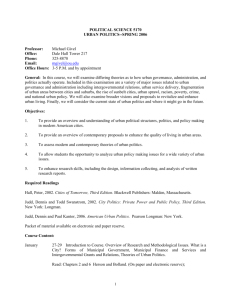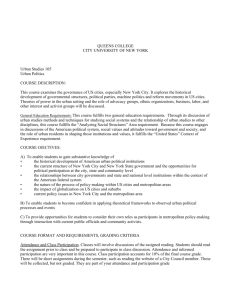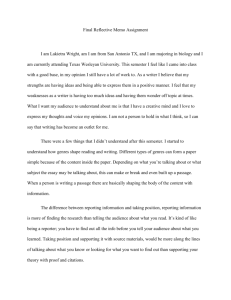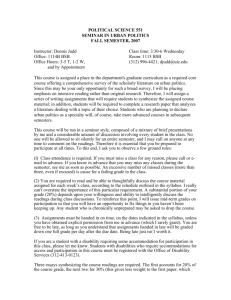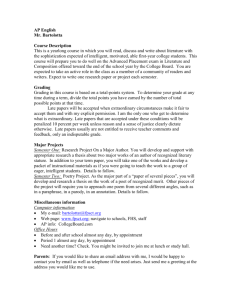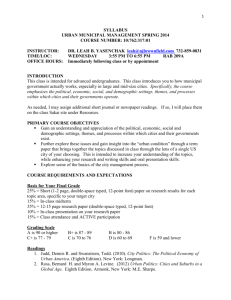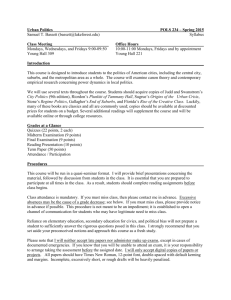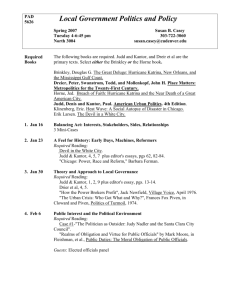proseminar in urban politics - UIC Department of Political Science
advertisement
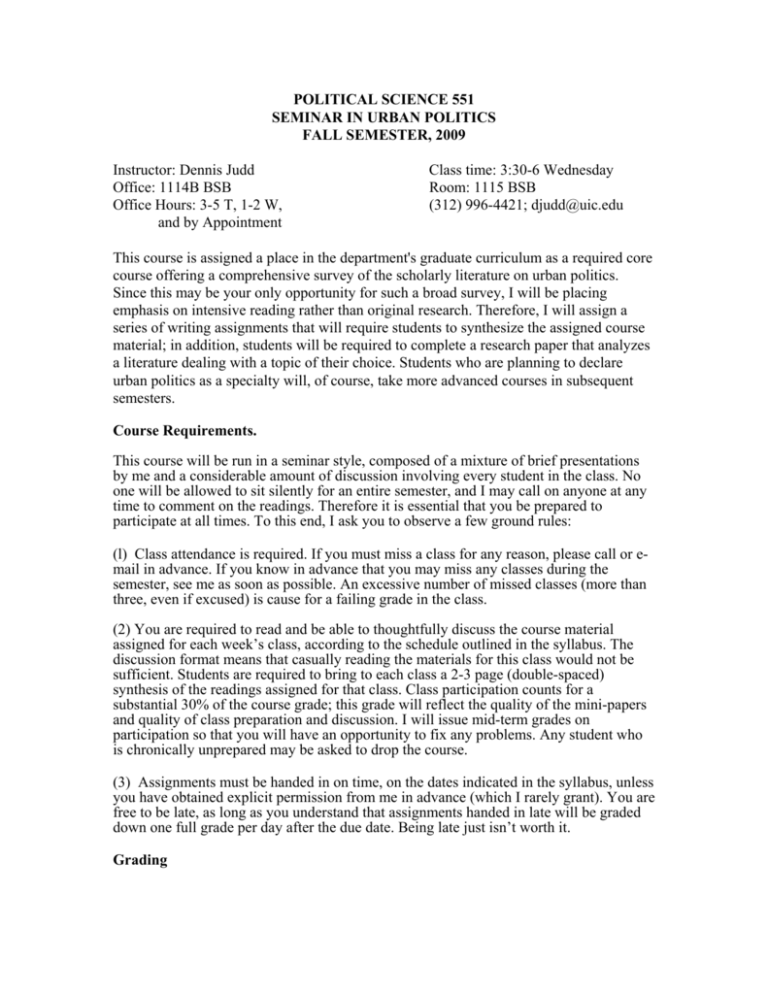
POLITICAL SCIENCE 551 SEMINAR IN URBAN POLITICS FALL SEMESTER, 2009 Instructor: Dennis Judd Office: 1114B BSB Office Hours: 3-5 T, 1-2 W, and by Appointment Class time: 3:30-6 Wednesday Room: 1115 BSB (312) 996-4421; djudd@uic.edu This course is assigned a place in the department's graduate curriculum as a required core course offering a comprehensive survey of the scholarly literature on urban politics. Since this may be your only opportunity for such a broad survey, I will be placing emphasis on intensive reading rather than original research. Therefore, I will assign a series of writing assignments that will require students to synthesize the assigned course material; in addition, students will be required to complete a research paper that analyzes a literature dealing with a topic of their choice. Students who are planning to declare urban politics as a specialty will, of course, take more advanced courses in subsequent semesters. Course Requirements. This course will be run in a seminar style, composed of a mixture of brief presentations by me and a considerable amount of discussion involving every student in the class. No one will be allowed to sit silently for an entire semester, and I may call on anyone at any time to comment on the readings. Therefore it is essential that you be prepared to participate at all times. To this end, I ask you to observe a few ground rules: (l) Class attendance is required. If you must miss a class for any reason, please call or email in advance. If you know in advance that you may miss any classes during the semester, see me as soon as possible. An excessive number of missed classes (more than three, even if excused) is cause for a failing grade in the class. (2) You are required to read and be able to thoughtfully discuss the course material assigned for each week’s class, according to the schedule outlined in the syllabus. The discussion format means that casually reading the materials for this class would not be sufficient. Students are required to bring to each class a 2-3 page (double-spaced) synthesis of the readings assigned for that class. Class participation counts for a substantial 30% of the course grade; this grade will reflect the quality of the mini-papers and quality of class preparation and discussion. I will issue mid-term grades on participation so that you will have an opportunity to fix any problems. Any student who is chronically unprepared may be asked to drop the course. (3) Assignments must be handed in on time, on the dates indicated in the syllabus, unless you have obtained explicit permission from me in advance (which I rarely grant). You are free to be late, as long as you understand that assignments handed in late will be graded down one full grade per day after the due date. Being late just isn’t worth it. Grading 2 An end-of-semester essay is due on December 7. There are two steps to completing this paper. The first requirement is a proposal, which I must approve before you begin writing the paper. At the beginning of the semester I will discuss topics with you and distribute and discuss a proposal template. Typically, it takes two, three, or more drafts to refine a proposal. It is the roadmap for your paper. The final paper counts for 60% of the course grade. Near the end of the semester all students will make brief presentations of their research. These presentations will account for 10% of the course grade. At all costs avoid the appearance of plagiarism; place quotation marks around quoted material, and provide citations for any idea, major concept, or data/information from a source. Intentional plagiarism on any assignment could be cause for failure without a rewrite option. A second plagiarized assignment will result in failing the course, and it could possibly jeopardize your graduate student career. So I implore you: please take care not to plagiarize! If you are a student with a disability requiring some accommodation for participation in this class, please let me know. Students with disabilities who require accommodations for access and participation in this course must be registered with the Office of Disability Services (312-413-0123). Readings The majority of the required readings for this course are available in the bookstore, and at your request I will place books on reserve as well. Nearly all of the books are available as used books on <Amazon.com> or other outlets, and are not expensive. A few additional required and/or recommended readings may be added from time to time during the semester. All readings listed except those specifically designated as “recommended” must be read by the date indicated. Make every effort to read or at least look reading designated as “recommended;” this is your call. In deciding about whether to buy books, keep in mind that most or all of these books will be needed when, someday, you may teach a similar course or need them to study for comprehensive exams. The following books are available in the bookstore, and are required reading. If you are a Ph.D. student I recommend that you purchase these books. Dennis R. Judd and Todd Swanstrom, City Politics, 7th ed. (Longman, 2009). Note: Do not buy this book; I will supply it. Clarence Stone, Regime Politics (University Press of Kansas, 1989). Richard DeLeon, Left Coast City (University Press of Kansas, 1992). Jessica Trounstine, Political Monopolies in American Cities (University of Chicago, 2008). Thomas J. Sugrue, The Origins of the Urban Crisis (Princeton University Press, 1996). Robert A. Beauregard, When America Became Suburban (Columbia University Press, 2005). Eric Avila, Popular Culture in the Age of White Flight: Fear and Fantasy in Suburban Los Angeles. Bernard Frieden and Lyn Sagalyn, Downtown Inc. (MIT Press, 1997). Saskia Sassen, Cities in a World Economy, 3rd. ed. (Pine Forge Press, 1996). 3 H.V. Savitch and Paul Kantor, Cities in the International Marketplace (Princeton University Press, 2002). If I have extra copies I am willing to lend some of the readings, but with an important stipulation. Believe it or not, many of the personal copies I’ve loaned over the years have come back to me marked up. I shouldn’t have to ask, but do not write marginal notes in any book I loan to you! SCHEDULE OF ASSIGNED READINGS August 26. Introduction to the course. I. The Political Economy of Urban America September 2. Judd & Swanstrom, chs. 1-5 & ch. 15. Also, from Raymond A. Mohl (ed.), The Making of Urban America, the following chapters: Gary B. Nash, “The Social Evolution of Preindustrial Cities,” pp. 15-36, and Madelon Powers, “The ‘Poor Man’s Friend’: Saloonkeepers, Workers, and the Code of Reciprocity in U.S. Barrooms, 18701920,” pp. 153-166 (on reserve). September 9. Jessica Trounstine, Political Monopolies in American Cities (University of Chicago, 2008); Dick Simpson, Rogues, Rebels, and Rubber Stamps, pp. 247-290 (on reserve). September 16. Clarence Stone, Regime Politics. September 23. Richard DeLeon, Left Coast City. II. The Urban Crisis of the 20th Century September 30. Judd & Swanstrom, chs. 6-12. Monday, October 5. Target date for approved paper proposal. October 7. Sugrue, The Origins of the Urban Crisis. October 14. Beauregard, When America Became Suburban. October 21. Avila, Popular Culture in the Age of White Flight. IV. Globalization, Recovery, and the Rise of a New Politics October 28. Bernard J. Frieden and Lynne B. Sagalyn, Downtown Inc.; Judd and Swanstrom, Chapter 13. November 4. Saskia Sassen, Cities in a World Economy. 4 November 11. Hank Savitch and Paul Kantor, Cities in the International Marketplace. November 18. Judd and Simpson, The City Revisited, selected chapters (to be distributed electronically). November 25. Thankgiving; no class. December 2. Student presentations. Monday, December 7. Semester Paper Due.



